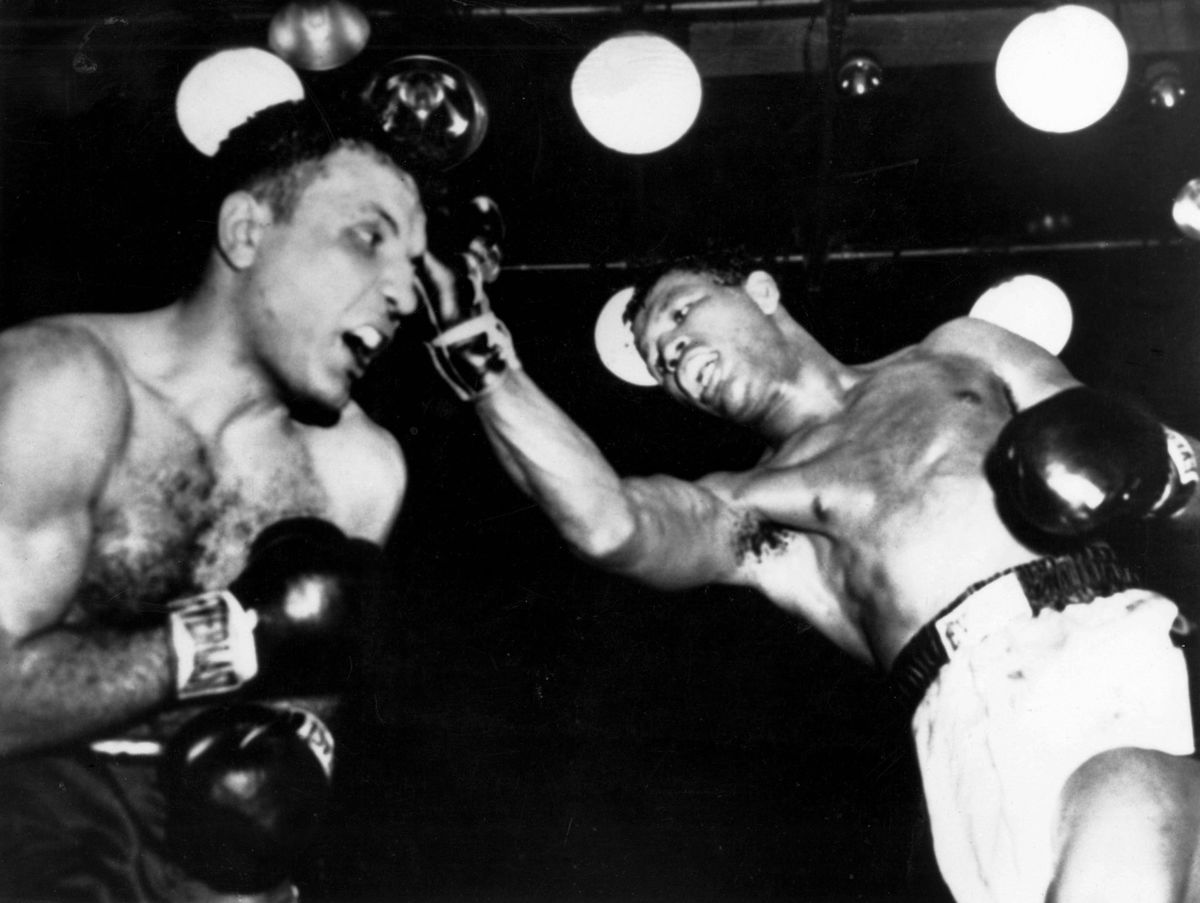
Imago
Bildnummer: 14521094 Datum: 31.12.2002 Copyright: imago/United Archives International Sugar Ray Robinson cuts loose in the thirteenth round of his fight with Jake La Motta in Chicago. Robinson won on this round on a TKO PUBLICATIONxINxGERxSUIxAUTxONLY UnitedArchives01004441; kbdig 2002 quer Boxer / Boxing Knock out Punch Image number 14521094 date 31 12 2002 Copyright imago United International Sugar Ray Robinson cuts loose in The thirteenth Round of His Fight with Jake La Motta in Chicago Robinson Won ON This Round ON A TKO PUBLICATIONxINxGERxSUIxAUTxONLY Kbdig 2002 horizontal Boxer Boxing Knock out Punch

Imago
Bildnummer: 14521094 Datum: 31.12.2002 Copyright: imago/United Archives International Sugar Ray Robinson cuts loose in the thirteenth round of his fight with Jake La Motta in Chicago. Robinson won on this round on a TKO PUBLICATIONxINxGERxSUIxAUTxONLY UnitedArchives01004441; kbdig 2002 quer Boxer / Boxing Knock out Punch Image number 14521094 date 31 12 2002 Copyright imago United International Sugar Ray Robinson cuts loose in The thirteenth Round of His Fight with Jake La Motta in Chicago Robinson Won ON This Round ON A TKO PUBLICATIONxINxGERxSUIxAUTxONLY Kbdig 2002 horizontal Boxer Boxing Knock out Punch
Boxing is often called a dirty game, and no decade has embodied that better than the 1940s. To understand why, you need to look back to December 1933, when the end of Prohibition finally allowed the production, import, transportation, and sale of alcohol. You might wonder, what does this have to do with ‘Sugar’ Ray Robinson refusing the Mafia’s offer to throw his 1945 fight against Jake LaMotta?
Watch What’s Trending Now!
But here’s the thing—it had everything to do with Prohibition. By the 1940s and 50s, the Mafia had already planted its roots deep in the country. With Prohibition in the rearview mirror—an era during which they made most of their fortune through selling alcohol—they had to pursue new means to keep the money flowing and their pockets full.
Enter boxing, with its mix of money, power, and corruption. It became the perfect target for the mob, as it involved only two parties. You buy one of them, convince them to take a dive, and bet the house on the other—you become rich—it was simple. Now, Jake LaMotta, at the time, had established himself as the best middleweight in the world. Enter his biggest rival in the sport, Ray Robinson.
ADVERTISEMENT
The two would fight each other six times, with Robinson dominating the series 5-1 from 1942 to 1951. Despite the lopsided tally, LaMotta had the distinction of being the first to defeat Robinson, who had previously been undefeated. He also managed to knock Robinson to the canvas multiple times, proving he was a formidable opponent in their legendary rivalry.
Regardless, come 1945, eight months after LaMotta handed Robinson his first loss, the duo met for the fifth time in their career. After a grueling 12 rounds, Robinson earned the honors as the victor via a split decision. According to the Source of Boxing on Instagram, this was the fight when the Mafia wanted Robinson to take a dive.
View this post on Instagram
ADVERTISEMENT
According to their report, Robinson “received a phone call from a man using the alias ‘Mr. Gray,’ who proposed that Robinson throw the fight.” The man on the other side of the phone was later revealed to be “Frankie Carbo, a notorious hitman associated with M—er Inc.” Robinson swiftly rejected this offer, opting to maintain the integrity of his career.
“This was a very brave move by ‘Sugar’ Ray Robinson, as he risked himself and his family being harmed by denying to do what the mob offered him,” Source of Boxing claimed. However, it’s worth noting that while Robinson didn’t bow down to the mafia, LaMotta did.
ADVERTISEMENT
Why did Jack LaMotta throw a boxing match for the mob two years after losing to Ray Robinson?
Two years after their fifth fight, Jack LaMotta took on Billy Fox in 1947 at Madison Square Garden in New York. The mob had seen an opportunity in LaMotta and offered him a shot at the middleweight title if he threw the fight against Fox. In exchange, LaMotta agreed to lose the match. However, he didn’t do it for money.
“It wasn’t fear, it wasn’t cowardice, it wasn’t even money,” LaMotta testified in court. “It was the only way. The only way to get my shot. What was mine—I’d earned it.” You see, despite his reputation, a title fight had eluded him for five years. So, LaMotta paid the mob $20,000 besides throwing the fight, to secure his future as a contender.
ADVERTISEMENT
A DIRTY BUSINESS –
A closer look at the mob's influence in the fight game, in particular with The Bronx Bull, Jake Lamotta#Boxing #History pic.twitter.com/yKWcZZ0lG3— KT_BOXING 🥊 (@KT_BOXING) July 21, 2018
The fix was so obvious that the betting odds shifted dramatically before the match. Moreover, LaMotta’s lackluster performance only fueled suspicions. In return, the mafia delivered the title fight LaMotta had longed for. He won the middleweight championship in 1949 against Marcel Cerdan.
Top Stories
Floyd Mayweather Faces Threat of Losing Post-Boxing Empire as 8-Figure Debts Mount: Report

“Rest in Peace”: Condolences Pour In as Legendary Coach Freddie Roach Mourns Personal Loss

Anthony Joshua Discharged From Hospital as Police Arrest Driver Over Fatal Car Crash in Nigeria

Where Is Reina Tellez From? Nationality, Ethnicity, and Religion of Amanda Serrano’s Opponent

Floyd Mayweather Breaks Silence as $402M Real Estate Deal Goes Allegedly Wrong

That said, both Sugar Ray Robinson and Jack Lamotta faced the Mafia during their time in the sport. While one refused to bend over, the other succumbed to it—to get what was rightfully his. What did you think about their careers?
ADVERTISEMENT
ADVERTISEMENT
ADVERTISEMENT
ADVERTISEMENT

